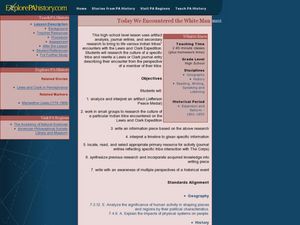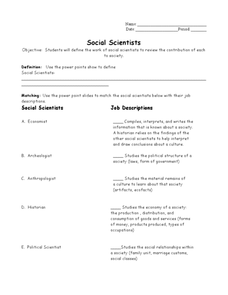Eastconn
Learning to Analyze Political Cartoons with Lincoln as a Case Study
Discover the five main elements political cartoonists use—symbolism, captioning and labels, analogy, irony, and exaggeration—to convey their point of view.
Curated OER
Crystal Blue Persuasion
Students examine historic posters, jewelry, quilts and buttons that were created to protest or call attention to a political issue. After evaluating how these items were used to communicate a political message, students create an item...
Curated OER
Geography and Artifacts of Mexico
High schoolers review the structure of government in Mexico and discuss how it is different than the United States. Using artifacts, they must label and identify the city or state in which the artifact originated. They use the artifact...
University of California
Bread and Circuses: Rome as a Site of Encounter
An intriguing lesson uses 12 Roman artifacts to explain Roman society and politics. Young historians view images of artifacts and learn how each one represents an aspect of Roman society. Academics also complete a hands-on activity to...
Smithsonian Institution
World War I
How did World War I effect the United States' status as a world power? Pupils examine a website to learn many interesting facts about American involvement during World War I. They read passages and interact with artifacts in an online...
Curated OER
social Studies: Yesterday, Today, and Tomorow
Sixth graders take an Internet trip back in time to explore ancient cultures. Working in teams, they assume the roles of theologian, cartographer, economist, political analyst, and anthropologist. The same groups then create time...
Curated OER
Artifacts: What Am I?
Students practice simple Japanese expressions. They explore the information available from artifacts. Groups of students attempt to figure out other groups culture by examining a series of artifacts in a paper bag.
Shell Education
Leaders from the 1790s
The Founding Fathers contributed to the United States in many ways. Class members explore various Founding Fathers through research, group work, and realia. The final product of group work are posters and artistic representations of...
Newseum
Weighing the Arguments
To understand how personal perspectives can affect policy and politics, scholars examine the woman suffrage media map and historical artifacts to analyze arguments for and against women's suffrage. Class members then take on the role of...
Newseum
Persuasion Portfolios
After class members brainstorm a list of current social and political issues, groups each select a different topic from the list to research. Teams create a portfolio of at least 10 examples of stories about their issue, stories that...
Museum of the Moving Image
Political Ads in Historical Context
Campaign ads target both timely issues and general themes. Presidential campaign ads from 1952 and 1988 provide class members an opportunity to compare how the topics ads choose to address can dramatically influence election outcomes.
Curated OER
Today We Encountered the White Man
Learners analyze and interpret artifacts and a timeline to get specific information. In this timeline lesson plan students work in groups to research an Indian tribe and write an information piece of their research.
Curated OER
Buried Treasures
Pupils, in teams, generate and research questions about Canada's receding glaciers. They then hold a 'press conference' in which each team provides answers for questions in their area of research. Finally, they pool their information to...
Curated OER
Political statements and protected speech
Students research and investigate what laws exist about freedom of speech. They write an article about this topic. Students interview the students at their school on this topic. They take a stand and support their stand with facts.
Library of Congress
Child Labor in America
Students investigate child labor during the Great Depression. In this US policy lesson, students evaluate multiple layers of the social, economic, and political affects of policy during the Great Depression. Students will engage in 5...
Smithsonian Institution
POWs
Why did Vietnam POWs and their families receive more media attention than POWs in previous wars? To answer this question, class members view artifacts, read articles, and engage in class discussion. Individuals then assume the voice of...
Smithsonian Institution
General George Washington, Military Leader
Teach pupils the characteristics that make George Washington such an effective leader, especially in context of his time period. Scholars view artifacts, participate in group work, create lists, compare and contrast, and discuss as a...
Curated OER
Using Primary Sources to Discover Reconstruction
Fifth graders discover how reconstruction had an impact on racial issues in the United States. For this Reconstruction lesson, 5th graders are introduced to primary vs. secondary resources and then rotate through stations to view...
Curated OER
Life in Old Babylonia: The Importance of Trade
Students read maps and artifacts for information indicating the existence of a trade network in Old Babylonia and beyond. They list goods imported to and exported from Babylonia. They indicate trading centers on a map of ancient...
Curated OER
Imperial China: Qin to Ming Dynasties
Looking for a way to supplement a unit on ancient China or world cultures? Look no further than this presentation, which combines rich information with entertaining pictures of Chinese artifacts. China's glorious dynasties provide a...
Curated OER
Who Wants to be a Millionaire?
Students examine wealth including analyzing and interpreting the sources of it. In this social responsibility lesson students create their own political cartoon.
Curated OER
Social Scientists
For this social scientist worksheet, students respond to 10 matching and short answer questions about the work of economists, archaeologists, anthropologists, historians, and political scientists.
Curated OER
Clash of Cultures: Comparing the 1920s and 1960s
Students identify the social, culturaland political problems of the 1920s and compare them to the problems of the 1960s. They research both eras and then make a presentation to the rest of the class.
Curated OER
Presidential Endorsements: Newspapers Decide
Students read The Plain Dealer editorial about its "non-support" of a candidate and other articles about this and discuss the newspaper's role in the political process. Students then form an editorial board and debate which candidate...

























